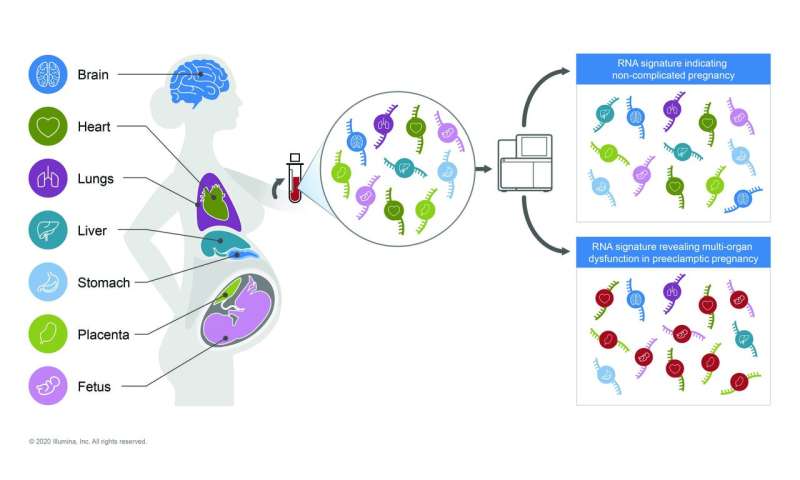
A team of researchers affiliated with several institutions in the U.S. and one in Canada has found that circulating RNA could be a possible predictor of early-onset preeclampsia. In their paper published in the journal Science Translational Medicine, the group describes their study of RNA circulating in the blood of pregnant women and what they found.
Preeclampsia is a condition in pregnant women characterized by high blood pressure and organ damage. Prior research has shown that in most cases, the condition does not occur until at least the 20th week of pregnancy—without treatment, the condition can be life-threatening. Because of the permanent damage it can do to such organs as the kidneys and liver, it is imperative that the condition be diagnosed in patients as early as possible. Unfortunately, in many cases, the condition goes unnoticed due to a lack of obvious symptoms. For that reason, medical scientists have been looking for ways not only to diagnose the condition early, but to predict its onset. In this new effort, the researchers looked at the possibility of using the presence of RNA from the placenta and fetal tissue in the mother’s blood as an indicator of impending preeclampsia.
The work involved taking blood samples and sequencing circulating RNA from 40 pregnant women who had already been diagnosed with preeclampsia, along with control samples from 73 other women. While looking for changes in RNA that might signal early-onset preeclampsia, they found they were able to connect over three dozen abnormalities in placental RNA to a higher incidence of preeclampsia. The researchers next applied a machine-learning algorithm to RNA samples from 12 women with preeclampsia, along with another 12 samples from a control group—using 49 RNA transcripts that appeared to be likely candidates for preeclampsia identifiers based on the first part of their work. They found the algorithm to be 85 to 89% accurate in predicting early-onset preeclampsia in the first phase of the test and 72% in the validation stage.
The researchers suggest that testing circulating RNA holds promise as a means for predicting early-onset preeclampsia in pregnant women.
Source: Read Full Article
